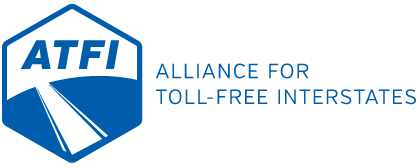RICHMOND, Va. -- Crumbling roads are top of mind for policymakers, who are at the same time considering how to prevent the Highway Trust Fund, which supports infrastructure maintenance and repair, from going broke. As the government considers different options--raising the federal fuel excise tax, imposing user fees--a new business coalition is arguing that it should outright reject one potential source of funding: expanding tolling on existing interstate lanes.
The Alliance for Toll-Free Interstates (ATFI), a coalition of associations representing restaurants, truckstops and travel centers, trucking companies, moving and storage businesses, vehicle rental firms as well as motorists, officially launched last week in Richmond, Va. Members include the National Association of Truck Stop Operators (NATSO), McDonald's, UPS and FedEx.
As public affairs manager Hayes Framme told CSP Daily News, the ATFI is focused on convincing the government to not expand tolling on the federal interstate system.
"We don't want to give the impression there isn't an issue with long-term funding," said Framme, who noted that the ATFI is open to ideas on funding the nation's highway infrastructure and endorses no particular one approach. "This is a conversation that will take creativity, innovation and rolling up the sleeves. … We will have to find something. But we want people to understand of all the options talked about and discussed, tolls are the least effective, most inefficient mechanism, and should not be on the table."
Tolls are technically prohibited on existing interstate lanes; however, the federal government has a 15-year-old pilot program that permits participating states to collect tolls to finance the construction of new interstate highways within their borders. Thus far, all three "slots" in the pilot have been reserved by states applying to the program, but the ATFI is wary about efforts to expand the pilot and is in fact calling for its repeal.
The ATFI is also trying to get ahead of lobbying by groups such as the International Bridge, Tunnel & Turnpike Association, which represents toll facility owners and operators. The IBTTA supports relaxing federal constraints on expanding tolling of the existing interstate system, insisting it should be available as a tool to support the upkeep and repair of the nation's worn-down highway infrastructure.
Both the ATFI and IBTTA are arguing their case before the public and Congress as it begins to discuss reauthorizing the Moving Ahead for Progress in the 21st Century Act (MAP-21), a two-year bill passed in 2012 that raises additional funding for federal surface transportation spending, and could provide an opening for new tolling.
Framme explained that the ATFI is opposed to tolling existing interstate capacity, adding that it has no objections to high occupancy/toll (HOV/HOT) lanes because they offer commuters a choice to stay on unrestricted roads or pay a premium. From its perspective, toll-free interstates provide unrestricted access and the ability to connect people and businesses across the country, and nurtures nationwide commerce efficiently and at a relatively good cost. Tolling, the ATFI argues, has several drawbacks, including:
Low efficiency. "Tolling is one of most inefficient methods for collecting revenue," said Framme, citing studies that determined a toll-booth facility can consume more than one-third of the revenues generated by tolls simply in its administrative costs. Even electric tolling is significantly less effective than collecting revenue via a fuel tax, Framme said, noting the need for "added bureaucracy" to enforce toll payment violations.
Traffic diversion. As commuters attempt to avoid using a toll road, they place greater strain on secondary and local roads, Framme argued. In addition, some local communities rely on restricted movement of people and goods on interstate. "Pockets that cater to people on the roads--McDonald's, Burger King, convenience stores--become affected when drivers and truckers divert to local roads along major areas," he said. "They lose that business."
Double taxation. Here, the ATFI's argument is fairly straightforward: When commuters buy fuel, they are already paying a tax that goes toward maintaining the federal interstates. "If you place tolls on those roads, you are forcing citizens to pay at the pump, and then on the road," said Framme.
Some legislators on the federal and state level, Framme said, have a perception that tolling generates a lot of money, and the perception that it is a strict user fee, instead of a tax. "If I vote to allow tolls, I can say I don't raise taxes--this is a user fee," he explained. "People know tolls are a tax--it's one you pay through a window vs. one you pay at the gas pump."
As the ATFI ramps up, it will be focused on educating legislators and the public on the need to keep existing federal interstates toll-free.
"It is a real serious threat to c-stores that thrive on unrestricted movement of people and truckers on the interstate," said Hammes. "It's also a serious issue when you talk about the cost of goods. Tolls will increase costs throughout the supply chain, trickling down to businesses and consumers."

